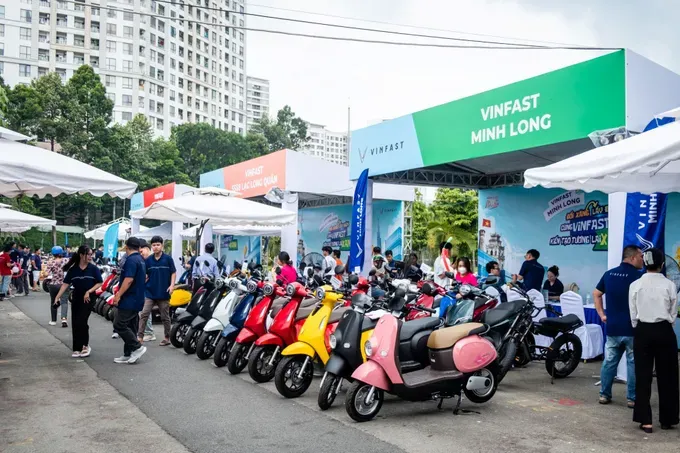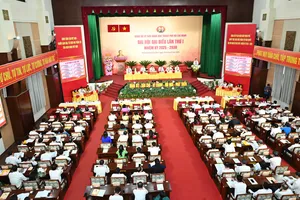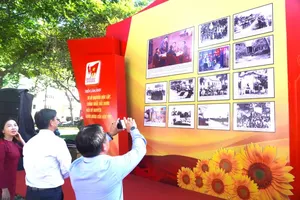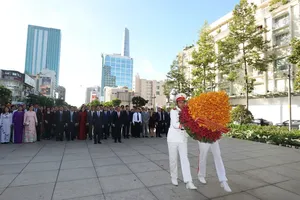
A survey of several electric motorbike dealerships reveals a notable rise in customer interest and purchases, particularly among students. At one such store in An Nhon Ward, sales representative Nguyen Hong Viet confirmed that the quantity of visitors for consultation has been steadily increasing since the city’s transition plan was announced. “We’re seeing many parents proactively researching and purchasing electric motorbikes for their high-school-aged children”, Viet said.
The owner of another dealership on Vo Thi Sau Street reported a significant sales surge in July and August, coinciding with the back-to-school season and heightened awareness of the impending restrictions on gasoline vehicles.
Models featuring removable batteries have become a popular choice for consumers. In terms of pricing, the market offers a wide range, with standard models typically falling between VND10 million and VND20 million (approximately US$400 - $800), while premium models command prices from VND40 million to VND60 million ($1,600 - $2,400).
While most electric motorbike manufacturers offer battery warranties of 18 months or longer, the specific policies vary significantly from brand to brand.
The Dat Bike brand, for instance, offers two warranty options: a standard two-year warranty or an optional ten-year package that covers free repairs for any battery issues. The battery for a Dat Bike model costs around VND20 million ($800), roughly half the price of the vehicle itself.
The YADEA brand provides free repairs for any faulty batteries under its warranty. Meanwhile, the Osaka brand provides a two-year warranty with a tiered replacement policy. Faulty batteries are repaired for free, but if a battery is severely damaged, the customer must contribute to the cost of a new one.
For VinFast, vehicles with lead-acid batteries come with a three-year warranty, while those with high-voltage lithium batteries are covered for five years. A replacement VinFast battery currently costs between VND10 million and VND11 million ($400 - $440).
Beyond warranties, however, a significant question is causing potential buyers to hesitate: where to charge them? The availability of public charging stations for electric motorbikes is a major “pain point”, with very few brands investing in this area, and the number of stations pales in comparison to those for electric cars.
In some HCMC apartment complexes, residents often resort to private charging services in their neighborhoods, paying between VND15,000 - 20,000 ($0.6 - $0.8) per charge. Those living in private houses typically charge their vehicles at home. Capitalizing on this demand, many cafes have started offering charging services for a fee of VND20,000 - 40,000 ($0.8 - $1.6).
CEO Nguyen Huu Phuoc of Selex Motors argued that dedicated charging stations are primarily necessary for high-mileage users, such as delivery drivers. “Most motorbikes are compact and have smaller batteries, which can easily be charged overnight at home”, he said.
A manager of a charging network development company echoed this, stating that while batteries are designed for standard household outlets, public charging infrastructure is essential for those who use their vehicles for commercial services.
From a macro perspective, Deputy General Director Hoang Manh Tan of Son Ha Group noted that while the opportunity for electric motorbike companies is immense, the challenges are equally significant. “The widespread adoption of electric motorbikes requires readiness from both manufacturers and consumers, alongside substantial investment in charging infrastructure”, he stated.
HCMC is currently developing a plan to convert 400,000 gasoline motorbikes to electric, beginning with shippers and ride-hailing drivers in phases, with implementation slated to start in 2026. The city is also considering a range of support policies, including tax incentives, credit loans, and vehicle trade-in programs.
Tran Anh Tung, a lecturer at HCMC University of Economics and Finance, believes financial support is crucial. “The city needs appropriate credit support, subsidies, or financial incentives to reduce the burden on residents, especially for gig economy workers”, he argued. “For this group, the transition requires electric motorbikes that offer sufficient durability and load capacity for transporting people and goods over long hours.”
























